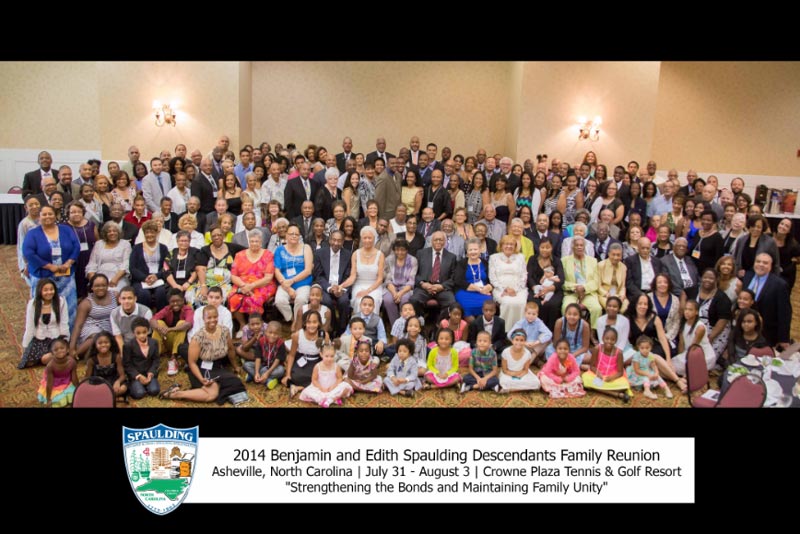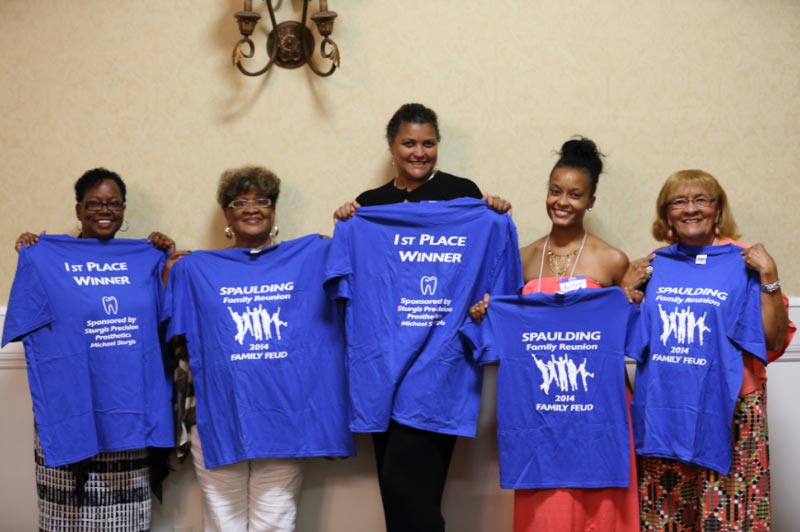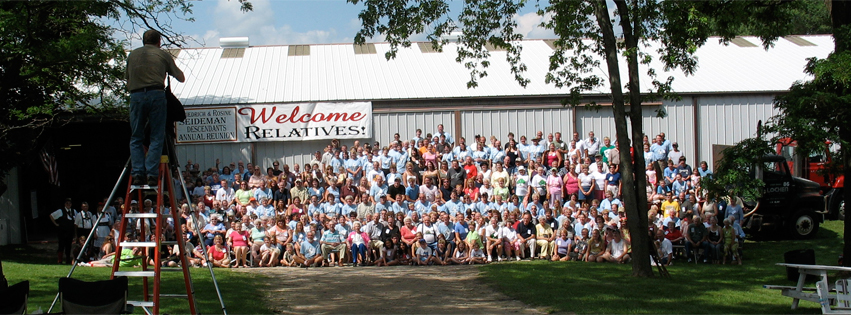Family Business: incorporating your reunion
by Sarah Jaquay
The Spaulding Empire
Businesses are created to solve problems; incorporating a family reunion is no different. “We did it to emphasize the importance of family. There’s been a degradation of family in our culture,” Vincent Spaulding said. He has been active in his family reunions since his father chaired one in Greensboro, North Carolina, in 1988. He currently serves as president of the 3,000-memberBenjamin & Edith Spaulding Descendants Association (BESDA), Inc., and the family’s foundation, The Benjamin & Edith Spaulding Descendants Foundation (BESDF), Inc. Both are incorporated in North Carolina, where the family originated.
A proud history
According to the Spaulding family’s website, their diverse descendants trace back to Benjamin Spaulding, a “free man of color,” who married Edith Delphi Jacobs, an Indian woman born in 1786. “Our family comes from the Bladen/Columbus County areas of North Carolina,” Vincent said. Benjamin was a successful businessman who distilled turpentine and had 10 children who begat 83 grandchildren. The rest of their interesting tale may be found at www.spauldingfamily.com.
But this story is about why families set up corporations to run their reunions and to conduct charitable activities such as scholarship programs.
Why a corporation?
There are several advantages to the corporate form (as opposed to sole proprietorships and partnerships). The main advantages are limited liability and continued existence. The difference between a sole proprietorship and corporate ownership is best illustrated by the following scenario. A customer in a store slips on a banana peel and sues the store owner. If the business is a sole proprietorship or partnership, then judgments against the owner may be satisfied using the owner’s business and personal assets. However, if the business is a corporation in good standing under state law and the store is property belonging to the corporation, judgments may be limited to the corporation’s assets.
Another benefit of incorporation is that the company’s business can continue beyond the life of its original owners. If the sole proprietor dies and no one in the family wants to run the business, it may have to close. Corporations, on the other hand, can continue to exist beyond the lives (or even involvement) of the original incorporators so long as they comply with applicable laws and practices.
Military Reunions
There are actually 27 different subsections under Internal Revenue Code (IRC) 501(c) by which organizations may seek exemption from federal taxes. The section dealing specifically with veterans’ organizations is 501(c)19. IRC 501(c)23 applies to veterans’ organizations created before 1880. Section 501(c)19 deals with veterans’ posts or organizations as well as auxiliary groups connected to military posts. Some veterans’ groups that hold reunions, such as The USS Rankin Association, enjoy federal tax-exempt status pursuant to this section. See www.ussrankin.org for more information.
Some veterans’ groups, depending on their purpose, may be exempt under other sections of 501(c), such as: 501(c)(4) – social welfare organizations, 501(c)(7) – social clubs, 501(c)(8) – fraternal beneficiary societies, 501(c)(10) – domestic fraternal societies and 501(c)(2) – title holding corporations. See Publication 3386, Tax Guide for Veterans’ Organizations, for more information, and–of course–seek advice from a professional when incorporating and establishing any tax-exempt organization.
[columns]


[/columns]
Reunion reasons
Paul H. Feinberg, Esq., recently retired from Baker Hostetler in Cleveland, Ohio, is an expert on tax-exempt organizations (TEOs). He has been active on the American Bar Association tax section’s exempt organizations committee. When asked what might motivate families to incorporate their reunions, Feinberg responded, “to run their reunion business, to make sure their reunions continue and limited liability reasons.” The sheer size and complexity of hosting large reunions every other year motivated the Spauldings to incorporate. “Our major product is our reunions, which are getting to be convention-sized,” Vincent said. There have been up to 600 Spaulding reunion attendees in the past, and 450 attended their Myrtle Beach reunion in 2006.
Vincent explained that BESDA, Inc., grew out of the association’s permanent reunion planning committee, which handled “every non-location-specific task associated with running a reunion.” These tasks include negotiating hotel contracts, maintaining the family directory and planning the budget. Their reunion budgets are funded primarily by registration fees, and include meals and lodging, souvenirs, picnics and bus transportation to events. “We have early bird, regular and late registration fees, which go up accordingly,” he said. The family’s 2008 reunion will be in Washington, DC, at a Marriott Hotel a half-block from the National Mall. The Spauldings host non-Carolina reunions every other time “to expose family members to places they might not otherwise visit,” Vincent said.
What’s profit got to do with it?
The world of corporate entities may be divided into for-profit and nonprofit corporations. Laws and regulations governing both are complex. Almost every word is a technical term defined under state statute and/or the Internal Revenue Code (IRC). Rules can have as many exceptions as regulations promulgated under them. As a result, Reunions Magazine readers should always consult competent legal advice in the state where they wish to incorporate either type of organization.
That said, a couple of general distinctions may be drawn. Generally, for-profit corporations make profits for the purpose of enriching founders, employees and shareholders, plus they pay state and federal corporate taxes. Nonprofit corporations may be formed for charitable or other nonprofit purposes and are not permitted to distribute their net profits to their founders or members. They enjoy exemption from federal corporate income taxes, if they qualify under one of the subsections of IRC 501(c).
Charitable organizations
According to Vincent Spaulding: Benjamin & Edith Spaulding Descendants Family (BESDF) is a tax-exempt organization incorporated for “educational, literary, charitable or scientific purposes” under IRC 501(c)3. These purposes are enumerated (along with a couple of others) as possible qualifications for being exempt from federal corporate income taxes and eligible for tax-deductible contributions as an IRC 501(c)3 organization. See IRS publication 557, “Tax-Exempt Status for Your Organization,” for more information.
Vincent said, “Our [BESDF’s] dream is to address all of these issues,” the foundation is just beginning to focus on its programmatic strategy. The Spaulding for-profit entity, BESDA, has given scholarships to family members “to attend universities or junior colleges.” No scholarships have been distributed yet through their foundation.
Scholarship programs
Feinberg pointed out that private foundations (such as a family foundation) must have their scholarship programs approved by the IRS in advance; otherwise they may be subject to penalty taxes if they make scholarship grants to individuals. He also explained that the IRS will consider whether the size of the charitable class eligible to receive scholarships is large enough. If not, scholarships may need to be offered to others (outside the family) based on similar criteria. It is important to note the IRS determines on a case-by-case basis what constitutes a “charitable class” and how large it should be.
The Family Feinberg
Feinberg said if he were going to incorporate his family reunion, he would set it up as a nonprofit organization under the laws of Ohio (because he lives there) and seek tax exemption under IRC 501(c)7. This section grants exemption from federal corporate income taxes for “social and recreation clubs” such as college fraternities and sororities, hobby clubs, garden clubs and country clubs. See IRS Publication 557, page 49. Feinberg explained that 501(c)7s “are generally exempt from state and federal corporate income taxes. The theory behind the federal exemption is that the clubs really have no income. It’s just members’ dues coming back to them in the form of goods and services,” Feinberg said. He compared it to a group of friends ordering a pizza and passing the hat for payment. “If there’s a little money left over, we just keep it for the next pizza and it’s not considered income,” he said.
Feinberg also suggested an easy way for families to run their scholarship programs: by giving these funds to a community foundation such as the Cleveland Foundation to establish a scholarship fund. Community foundations accept donations from the public for charitable purposes. (By contrast, private foundations generally are funded by one family or group.) “As a result, community foundations are not subject to the restrictions imposed on private foundations, particularly the limits on making scholarship grants. If such a scholarship fund is established, then the community foundation has to make the determination whether the fund is for a large enough charitable class,” he said. For a list of community foundations, see the Council on Foundations website at www.cof.org on their “Community Foundations Locator” page. Bulking up for TEOsThere’s an urban legend that once upon a time family groups incorporated their reunions as nonprofit organizations and sought federal tax exemption status under IRC 501(c)3 to take advantage of bulk mailing rates. While some tax-exempt organizations can reduce mailing expenses under the US Postal Manual rules, it’s no longer much of a motivation. In this age of websites, the internet and e-mail newsletters, most reunion communications escape the need for any kind of postage.
Procuring professionals
Incorporating a family association and seeking federal tax-exempt status is complicated and generally requires the services of a professional. All 50 states have their own incorporation statutes with varying requirements, and dealing with the IRS should never be undertaken lightly. Reunions Magazine Editor Edith Wagner has been asked on numerous occasions, “How do we incorporate our family reunion?” Her advice has always been spot-on: “Find attorneys or accountants in your family and ask them who they would use.”
Banking your reunion
Where should money raised at a family reunion be kept? Should it be handed to the person in charge of the next one or put in a savings account? In whose name? Just what do you do with all this money until it is needed the following year? How do you handle the money that is turned in by family members to cover any fees associated with the reunion?
Put your reunion money in a business account in the name of the reunion. It can be in any bank that will serve your reunion well, but if it’s in the city where the reunion is being held you’ll have instant access when you need it most. Check with your banker about setting up an account that has the fewest/lowest charges.
If you can plan ahead and write only one check at the time of your reunion, your banker might let you use a counter check to avoid having checks printed. On the other hand, cancelled checks are your best receipt for record keeping, reporting and to provide accurate proof of where the funds went. If you choose a business account, you’ll need to maintain a minimum balance to avoid fees.
If you can hold (not touch) the money for six months or more, buy 6-, 12-month, or longer, CDs. This must be money you will not need before the CD matures (otherwise early withdrawal penalties apply). Make a little extra money for your reunion but don’t lose the benefit by not planning ahead.
Your reunion money can be kept by the treasurer, chairperson or someone chosen by the group. You must decide who will have access to the money and have those people sign the signature card to eliminate confusion. The bank will probably require two signatures and may require a resolution from the group authorizing the account. Money can be available if you choose to pay as you go. If you’re limiting the number of checks you’re writing, however, ask persons who incur expenses along the way to collect receipts and wait to be repaid at the reunion.
Establish a budget and how expenses will be approved so there are no surprises and you have enough to cover what everyone spends. Be sure you account for every penny you spend because, no matter how much you as chairperson may invest personally in the reunion, your family members will be concerned about where “their” money is going.
Plan a treasurer’s report at your reunion and offer to have anyone check your books at any time to verify your statements.
Regarding the money, Yvonne Captain wrote that experience taught her to be very careful, especially with relatives who feel comfortable telling you what they think! In order to avoid thoughts that the money was misspent, she set up a separate account for the Captain Family Reunion and made sure at least two people handled the money at all times. Different people were assigned to take care of t-shirts, hotel and dues. She scheduled a business meeting to discuss, among other things, where the money went. Captain says, “It worked out extremely well, because everybody understood why they had to pay dues.” Since they did not overspend, they had a little extra something in their bank account.
Carole Neal also set up a separate bank account, so incoming checks could be made payable to the Seals Family Reunion. Neal lives in California and the reunion was in Louisiana, so service providers required payment either by cash or travelers checks. Her bank established a four-month free checking account. There were two names on the signature card, but only one was required to sign a check. She did not order checks, just used starter checks that come when you open an account.
The committee set a low registration fee schedule to make the reunion affordable: seniors 65+ $25, adults $45, age 12-18 $30, age 3-11 $20, age 2 & under free. Fees covered all activities and three reunion meals. Setting fees was tricky, because they didn’t know how many would be attending.
Rob Fish, Powell, Ohio, writes about his Class of 1971 reunion. A small treasury is carried over from the previous reunion to cover initial costs and setup for the next reunion. The balance comes from fees charged for attending the banquet.
LueVenia R. Alford, Maple Heights, Ohio, reports that for the Pressley Family Reunion, the host city establishes, approves and maintains the budget and finances for that city. The fee is $90 per family (a parent or parents with children under age 18) and $45 per single person. Transportation and hotel are paid by members. The fees are used for entertainment on Friday evening, activities on Saturday, including a banquet Saturday night and a picnic on Sunday.
The organizer of the Chell Family Reunion is responsible for financing the reunion until money starts coming in. They price the reunion per person. They raffle a handmade quilt each year to offset the organizer’s expenses. Several family members who can well afford it split any cost overruns, including extra scholarships if more are needed than can be covered by the collected funds.
Elaine Bender Bowie, Waldorf, Maryland, says her family sets small fees and passes a hat at the end of each reunion, which is probably a pretty good idea for any reunion, no matter how well endowed.
About the author
Sarah Jaquay is a freelance writer in Cleveland, Ohio. She practiced law there for about 10 years, but is no longer active. Please note she is not giving any legal advice in this article.
COMMENT
Regards,
Pittsburgh, Pennsylvania









